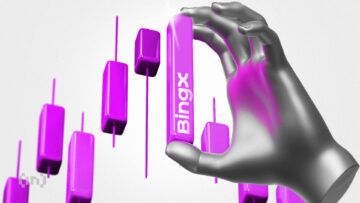This guide explores the best crypto contract trading platforms on the market, showcasing and evaluating the features of each. We consider trading fees, liquidity, security features, and regulatory compliance, as these factors can all define and impact the trading experience. Here are the top options for traders in 2024.
- The best crypto contract trading platforms in 2024
- 1. OKX
- 2. Binance
- 3. Bybit
- 4. Kraken
- 5. BYDFi
- 6. MEXC
- 7. BingX
- How do the top crypto contract trading platforms compare?
- What is contract trading in crypto?
- How do long and short-term contract trading work?
- How to choose the right crypto contract trading platform
- Benefits of contract trading in cryptocurrency
- Risk of contract trading in cryptocurrency
- Crypto contracts trading vs. traditional options trading
- How do I invest in crypto contracts?
- Choose the best crypto contract trading platform for you
- Frequently asked questions
The best crypto contract trading platforms in 2024
1. OKX
OKX covers a wide range of crypto contracts, including perpetual swaps, futures, and options. The platform also offers features like copy trading and user-friendly crypto options. A standout feature of OKX is its competitive pricing structure. Maker fees start at 0.08%, and taker fees begin at 0.1%. These fees can decrease further depending on the user’s trading volume and holdings of OKB tokens. Unique to OKX is its trading bot marketplace, where users can use trading bots developed by others or choose to share their bots. Bot creators benefit from a portion of the profits generated by their bots.
Offers an extensive selection of 330+ cryptocurrencies
Includes a variety of trading products like futures and options
Competitive fees that can be reduced through OKB tokens and trading volume
Provides a marketplace for user-generated trading bots
2. Binance
Binance Futures is the most liquid crypto contract trading platform on this list, featuring futures contracts for various cryptocurrencies. The platform offers traders the choice of using cross-margin or isolated margin modes, allowing up to 125x leverage on certain trading pairs. Traders can engage in futures contracts that are settled in stablecoins or those settled in the underlying cryptocurrency.
Moreover, Binance Futures boasts a competitive fee structure, which can be further reduced when fees are paid using the BNB token. The platform also supports options trading, offering advanced traders additional opportunities and strategies.
High liquidity for crypto contracts
Access to both major and minor cryptocurrencies
Up to 125x leverage on selected pairs
Reduced trading fees with BNB token usage
3. Bybit
Bybit makes the list of top crypto contract trading platforms as it facilitates seamless trading of longer-term futures with delivery contracts, including a six-month expiry for Bitcoin and Ethereum. Perpetual futures are available for those interested in trading other cryptocurrencies like Dogecoin, Ripple, or Cosmos. Bybit features a competitive futures trading fee of 0.055% per slide, which can be further reduced by increasing your monthly trading volumes.
The platform’s accessibility is enhanced through its user-friendly website and mobile app, available for iOS and Android devices.
Integration with TradingView on both desktop and mobile
Copy trading, automated bots, and OTC trading
24/7 customer support is available through live chat
4. Kraken
Kraken is a leading spot trading exchange and also offers a futures market. It supports an impressive lineup of 95 cryptocurrencies, ranging from major players like Bitcoin, Ethereum, and Algorand to others like Dogecoin, Aave, and Stellar.
Kraken provides perpetual futures, which are backed by U.S. dollars. Traders can access these futures through the Kraken Pro platform, which offers a huge variety of trading tools. These include customizable charts, live order books, technical indicators, and unique order types.
When trading futures on Kraken, traders can leverage up to 50x. Kraken’s trading fees are competitive, with a charge of 0.05% per slide. These fees decrease as trading volumes increase. Additionally, Kraken offers leveraged tokens, similar to futures but without the risk of liquidation, though they are limited to a maximum of 5x leverage, which may not suit all traders.
Competitive trading fees, with a charge of 0.05% per slide, decrease as trading volumes increase
Leveraged tokens, which are similar to futures but without the risk of liquidation
5. BYDFi
BYDFi is another top platform for contract trading, primarily due to its extensive array of trading options, pairs, and instruments. A key feature of BYDFi is its derivatives trading offering, which includes perpetual contracts that settle in USDT and COIN-M perpetuals, where specific coins act as collateral. The platform provides over 150 pairs for USDT perpetuals with the option to leverage up to 200x, significantly higher than most U.S. exchanges. Although it offers only five COIN-M perpetuals, these involve major and carefully selected cryptocurrencies.
Lite contracts allow for leveraged trading to amplify returns
Lite contract calculator and a demo trading feature for practicing strategies without financial risk
A vast range of leveraged tokens enables trading on price changes with leverage but without margin requirements
The platform’s user interface includes both simplified and advanced dashboards
BYDFi’s Grid trading robot automates trading within a set range
6. MEXC
MEXC offers perpetual futures trading, which are futures without expiry dates, catering to both short-term and long-term traders. MEXC provides two types of perpetual futures: those backed by USDT and those settled in the underlying cryptocurrency, COIN-M futures.
Additionally, MEXC stands out by supporting a broad array of top-tier altcoins, including Polygon, Solana, Ethereum, Ripple, ApeCoin, BNB, Cosmos in addition to its Bitcoin futures, which allow for up to 200x leverage. However, it is important to note that MEXC does not offer options trading for those interested in other derivative types.
Low trading fees, charging only 0.02% for future transactions, are applied at opening and closing positions
High liquidity, especially in its futures markets
Exceptional order-matching speed, processing up to 1.4 million transactions per second
The trading interface fully integrates with TradingView, offering advanced charting tools, drawing capabilities, and technical indicators
Accessible on mobile devices through iOS and Android apps
7. BingX
BingX is a crypto platform with perpetual and standard futures contracts settled in the USDT stablecoin. Like other major platforms, BingX offers a wide range of cryptocurrencies, providing traders access to futures for nearly all significant altcoins. BingX offers a program for new users that can yield substantial bonuses based on trading volume. Additionally, the platform organizes the SuperX trading competition, offering top traders the opportunity to win rewards beyond their regular trading profits.
A vast selection of cryptocurrencies is available for trading
Rewards programs for new users and competitive trading events
How do the top crypto contract trading platforms compare?
| Platform | Best for | Availability | Derivatives fees | Max leverage |
| Coinbase | Best for futures trading | U.S., Europe | 0% – 3.99% | 10x |
| OKX | Best for option trading | Worldwide, not U.S., | From 0.05% | 125x |
| Binance | Best for a wide range of contracts | Worldwide, not the U.S. | From 0.05% | 125x |
| Bybit | Best for beginners | Worldwide, not U.S. | From 0.055% | 125x |
| Kraken | Best for advanced trading | Worldwide | From 0.05% | 50x |
| BYDFi | Best for perpetual swaps | Worldwide, not U.K. | From 0.05% | 200x |
| MEXC | Best for low fees | Worldwide, not U.S. | From 0.02% | 200x |
| BingX | Best for rewards | Worldwide, not the U.S. | From 0.02% | 150x |
What is contract trading in crypto?
In crypto contract trading, individuals agree to exchange the difference in the price of crypto between the time the contract opens and closes without owning the underlying asset.
This method lets traders speculate on price movements, bet on prices going up or down, and potentially profit from these predictions. These contracts are typically leveraged, meaning traders can control large amounts of cryptocurrency with a relatively small amount of capital, which can increase both potential gains and risks.
How do long and short-term contract trading work?
In contract trading, “long” and “short” are terms used to describe the types of bets traders make on the future price movements of cryptocurrencies.
- Long contract trading: When traders go long, they bet that the cryptocurrency’s price will increase. Essentially, people are buying expecting to sell at a higher price later. If the price goes up as anticipated, they profit based on the difference between the buying and selling prices.
- Short contract trading: On the other hand, when a trader goes short, they bet that the cryptocurrency’s price will decrease. This involves selling the cryptocurrency first, even without owning it, with the plan to buy it later at a lower price. If the price falls as expected, the trader can buy it back at the lower price, return what they borrowed, and keep the difference as profit.
Both types of trading often use leverage, which means using borrowed money to increase potential returns. This can make both potential profits and losses significantly larger than in traditional trading.
How to choose the right crypto contract trading platform

Choosing the right crypto contract trading platform involves considering various factors to ensure that the platform meets your trading needs and provides a secure, reliable environment.
Here’s how to evaluate different platforms:
- Type of trading offered: Determine whether the platform supports the types of trading you are interested in, such as derivatives trading, leverage trading, futures contracts, or options contracts. Each type has its own risks and benefits.
- Trading fees: Check the fees associated with trading on the platform. This includes any fees for opening or closing positions and withdrawal fees. Lower fees can significantly impact your overall profitability.
- User interface: The platform should have an easy-to-navigate interface that suits beginners and experienced traders. A good interface can simplify the trading process and help you make decisions faster.
- Security features: Security is crucial in cryptocurrency trading. Look for platforms with strong security measures such as two-factor authentication, encryption, and cold storage of assets.
- Regulatory compliance: Ensure the platform complies with relevant regulations in its operating jurisdictions. This compliance is important for protecting your investments.
- Liquidity: High liquidity means that there are enough trading activities on the platform to allow you to execute trades quickly and at predictable prices. High trading volume is often a good indicator of liquidity.
- Availability of tokens: Consider what cryptocurrencies are available for trading. Some platforms offer a wide range of tokens, while others focus on more popular ones.
- Type of exchange: Decide between using centralized or decentralized exchanges. Centralized exchanges usually offer more liquidity and faster trades but require you to trust the platform with your funds.
- Customer support: Good customer support can be invaluable, especially if you encounter issues with your account or trades.
Benefits of contract trading in cryptocurrency
Contract trading in cryptocurrency offers several benefits that make it an attractive option for many traders:
- Access to derivatives: Contract trading platforms typically offer access to futures and options contracts. These financial instruments enable more complex trading strategies that can be tailored to manage risk and enhance potential returns.
- Profit from market movements: Contract trading enables traders to profit from rising and falling markets. Traders can make gains regardless of the overall market direction by going long (buying) or short (selling).
- High liquidity: Popular contract trading platforms usually have high liquidity, meaning that large trading volumes can be executed quickly and at stable prices. This is crucial for traders who need to enter or exit positions quickly.
- Regulatory compliance: Many crypto contract trading platforms adhere to regulatory standards, which can provide a level of security and trust. Compliance helps protect traders’ investments and ensures fair trading practices.
- Diversification: Through contracts, traders can access a variety of cryptocurrencies without needing to hold the actual tokens. This allows for easier diversification of a trading portfolio, which can help manage risk.
- Enhanced trading tools and features: Contract trading platforms often offer advanced trading tools and features, including comprehensive charting packages, automated trading systems, and detailed market analysis. These tools can help traders make informed decisions and execute more effective trading strategies.
Overall, the main benefit of contract trading in cryptocurrency is that it can provide sophisticated mechanisms for traders looking to exploit market inefficiencies, hedge, or increase exposure to markets with a relatively small capital outlay.
Risk of contract trading in cryptocurrency

Contract trading in cryptocurrency, while offering potential benefits, also carries several risks:
- Leverage risks: While leverage can magnify profits, it also increases the potential for significant losses. Small price movements can lead to rapid losses, possibly exceeding the initial investment.
- Market volatility: Cryptocurrencies are notoriously volatile. Rapid price changes can occur unexpectedly, which can be amplified in contract trading, leading to substantial losses.
- Liquidity risk: During periods of extreme market turbulence, even large platforms may face liquidity issues, making it difficult to enter or exit positions at desired prices.
- Regulatory changes: The regulatory environment for cryptocurrencies is still in its infancy. Sudden changes in laws or regulations can affect the legality and operation of trading platforms, impacting market conditions and trader positions.
- Complexity of derivatives: Trading derivatives like futures and options contracts can be complex and may not be suitable for all traders, particularly those with limited experience. For example, to trade Bitcoin futures effectively, one must understand market trends and have access to real-time data and analytics.
- Counterparty risk: In contract trading, there’s always a risk that the other party in the contract may fail to meet their obligations. This is particularly a concern on less regulated platforms.
- Security risks: Despite security improvements, trading platforms can still be vulnerable to hacks and security breaches, potentially leading to the loss of funds.
- Overnight fees: Holding positions open over time can incur costs, known as rollover or swap fees, which can eat into profits or increase losses.
Crypto contracts trading vs. traditional options trading
Crypto contract trading and traditional options trading share some fundamental similarities. However, they also have distinct differences catering to different traders and investment strategies.
Similarities
- Both are derivative instruments, meaning their value is derived from the price of an underlying asset, which could be stocked in the case of traditional options and cryptocurrencies for crypto contracts.
- Both allow traders to hedge or mitigate risk in their investment portfolios.
- Traders can speculate on price movements to profit from rising or falling markets.
- Both types of trading can offer leverage, allowing traders to control large amounts of the underlying asset with a relatively small capital outlay.
Differences
- Underlying assets: Traditional options are tied to various assets, including stocks, commodities, and indices, while crypto contracts are specifically related to cryptocurrencies.
- Market hours: Traditional options trading is generally limited to the hours of major stock exchanges, typically Monday through Friday during business hours. Crypto contract trading, on the other hand, occurs 24/7, offering round-the-clock trading opportunities.
- Regulatory environment: Financial authorities heavily regulate traditional options trading, such as the U.S. SEC or FCA in the U.K., providing a layer of security and investor protection. Crypto contract trading operates in a less regulated space, which can offer more freedom but also increased risk.
- Volatility: Cryptocurrencies are generally more volatile than most traditional assets, which can lead to larger and more rapid price swings. This means potentially higher returns but also greater risk.
- Accessibility: Crypto contract trading is typically more accessible globally, often requiring just an internet connection and minimal identification. Traditional options markets may have more barriers to entry, such as brokerage accounts, higher capital requirements, and jurisdictional restrictions.
Crypto contracts trading vs. traditional options trading
| Aspect | Crypto contracts trading | Traditional options trading |
| Underlying assets | Cryptocurrencies only | Stocks, commodities, indices, etc. |
| Market hours | 24/7, including weekends and holidays | Limited to stock exchange hours, typically Monday to Friday |
| Regulatory environment | Generally less regulated, varying by country | Heavily regulated by financial authorities like the SEC or FCA |
| Volatility | Typically higher due to the nature of cryptocurrencies | Generally lower, dependent on the underlying asset |
| Accessibility | High global accessibility, minimal barriers to entry | Requires brokerage accounts, subject to more regulatory checks |
| Complexity | Simpler with fewer types, but growing in variety and complexity | A wide range of complex strategies are possible |
| Settlement | Usually, cash or digital currency settlement | Often involves the possibility of delivery of the actual asset |
| Trading hours | Continuous trading opportunities | Restricted to specific times and days |
| Leverage | Often highly leveraged | Leverage available varies with product and broker |
| Risk management | Hedging is possible but generally riskier | Broad options for hedging and risk management |
What are the advantages of using crypto contract trading platforms?
Crypto contract trading platforms offer several advantages that can be appealing to both novice and experienced traders:
- Accessibility: Crypto trading platforms are generally accessible from anywhere in the world with an internet connection. This global access allows traders from various regions to participate without the need for traditional brokerage accounts.
- Market hours: Unlike traditional financial markets that have set trading hours, crypto markets operate 24/7.
- Leverage: Many crypto contract trading platforms offer leverage, which allows traders to multiply their exposure to market movements without needing the full amount of capital normally required to own the asset outright. This can significantly increase potential profits (though it also increases risk).
- Diversity of instruments: These platforms often provide a variety of trading instruments, including futures, options, and perpetual futures contracts. This range allows traders to employ different strategies and hedge their positions.
- Speed of transactions: Crypto trading platforms typically offer fast transaction speeds, reducing the time it takes to enter and exit positions, which is crucial in a volatile market.
- Latest technology: Many crypto trading platforms are at the forefront of implementing the latest technology, which can offer traders more advanced tools and features for analysis, automated trading, and copy trading. Futures copy trading allows less experienced traders to mirror the positions of seasoned professionals, making it easier to enter complex markets.
- Lower barriers to entry: Crypto platforms often have lower entry requirements compared to traditional finance, making it easier for smaller investors to start trading.
While these advantages make crypto contract trading attractive, traders need to consider the associated risks and ensure they understand the market before participating.
An anecdote of crypto contract trading going wrong:
How do I invest in crypto contracts?
Investing in crypto contracts involves several straightforward steps. Here’s a simple guide to get you started:
Step 1: Educate yourself
Before investing, learn about different types of crypto contracts, such as futures, options, and perpetual swaps. Understand the terms, mechanics, and risks associated with each.
Step 2: Choose a reliable trading platform
Selecting the right crypto futures trading platforms is essential for accessing various instruments and leverage options. Consider security features, regulatory compliance, trading fees, and customer support.
Step 3: Create and verify your account

Register for an account on your chosen platform. You will likely need to verify your identity with documents such as a passport or driver’s license, depending on the platform’s requirements and your region’s regulations.
Step 4: Deposit funds
Once your account is set up, deposit funds. Most platforms accept cryptocurrency deposits, and some also support fiat currencies like USD or EUR. Choose your preferred method and follow the instructions to make a deposit.
Step 5: Start with a trading plan
Develop a trading plan. Decide how much you want to invest, set your profit targets and loss limits, and how you will manage risks, especially since crypto contracts can involve leverage.
Step 6: Choose your contracts
Select the type of contracts you want to trade. Each contract has specific characteristics and terms, such as expiration dates for futures and strike prices for options. Learning how to trade Bitcoin options can significantly enhance your ability to manage risk and capitalize on market volatility.
Step 7: Place your trades
Use a trading interface to place your trades. You can choose from various order types, such as market orders (buy/sell immediately at current prices) or limit orders (set a specific price at which you want to buy or sell).
Step 8: Monitor and manage your positions

Once you have opened positions, monitor the market closely. Use tools like stop-loss orders to manage risk. Moreover, be prepared to adjust your positions based on market movements and news.
Step 9: Close your positions
Decide when to exit your trades. Depending on the contract type, you can close your positions by executing a trade in the opposite direction or letting your options or futures expire.
Step 10: Withdraw or reinvest profits
After closing your positions, you can choose to withdraw your profits or reinvest them into new contracts. Check the withdrawal procedures and limits on your platform. Following these steps will help you start investing in crypto contracts. Remember, it’s important to continually educate yourself and stay updated with market trends and news to make informed decisions.
Looking to expand beyond the spot markets but not sure where to start? Here’s how to trade Bitcoin futures and options like a pro.
Choose the best crypto contract trading platform for you
Choosing the right crypto contract trading platform is essential. Whether your focus is on derivatives or leverage trading, the ideal platform should offer competitive trading fees, a user-friendly interface, and top-end features. Remember that contract trading is high-risk, and you should never invest more than you can afford to lose.
Frequently asked questions
OKX, BingX, and Binance are considered some of the best platforms for options trading in cryptocurrency, offering extensive tools and a wide range of options. They provide deep liquidity, trading interfaces, and comprehensive security measures. Each platform caters to different levels of trader expertise and geographical availability.
To evaluate the liquidity of a trading platform, check the trading volume of your desired assets, observe the tightness of the bid-ask spread, and note the speed at which trades are executed. High trading volumes and narrow spreads typically indicate good liquidity. Platforms often publish their liquidity metrics, which can provide further insights.
Common fees in crypto contract trading include trading fees (maker and taker fees), withdrawal fees, and, in some cases, overnight financing fees (or funding rates) for holding positions open over a period. Trading fees vary by platform and can be reduced based on trading volume or platform-specific tokens. Some platforms may also charge deposit fees or fees for special order types.
Yes, you can trade cryptocurrency contracts through various derivatives like futures, options, and perpetual swaps. These contracts allow traders to speculate on the future prices of cryptocurrencies without directly holding the asset. Most major crypto exchanges offer some form of contract trading.
The best platform for crypto trading depends on the trader’s needs, but Binance and Kraken are widely regarded as leading choices. They offer many cryptocurrencies, advanced trading features, and top-end security measures. Considerations for choosing a platform should include fees, available cryptocurrencies, and user interface.
Yes, Binance is a contract trading platform that offers a variety of derivative products, including futures and options. It provides high liquidity, extensive leverage options, and a wide range of crypto pairs. Binance is known for its low fees and comprehensive platform features.
The compatibility of contract trading with Islamic finance principles depends on the specific contract and trading method. Generally, conventional leveraged contract trading might not be considered halal due to the involvement of interest, excessive uncertainty, and speculation. However, Islamic finance products that comply with Shariah law are available on some platforms.
Disclaimer
In line with the Trust Project guidelines, the educational content on this website is offered in good faith and for general information purposes only. BeInCrypto prioritizes providing high-quality information, taking the time to research and create informative content for readers. While partners may reward the company with commissions for placements in articles, these commissions do not influence the unbiased, honest, and helpful content creation process. Any action taken by the reader based on this information is strictly at their own risk. Please note that our Terms and Conditions, Privacy Policy, and Disclaimers have been updated.











